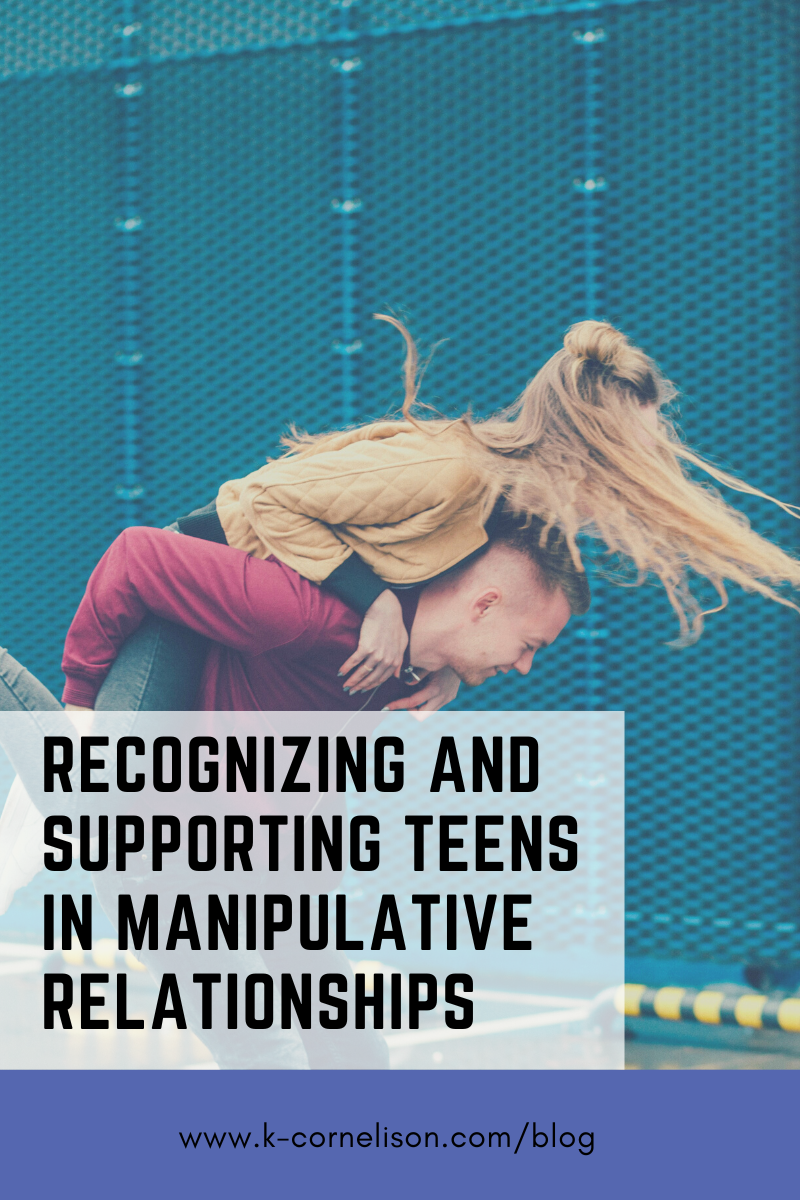Recognizing and Supporting Teens in Manipulative Relationships
When Does Caring Become Controlling?
Dating and relationships can be an exciting part of adolescent growth and development. Not only is it an opportunity for young people to figure out who they are and who they like, but teen relationships also help build communication skills and emotional intelligence. Unfortunately, some teens also find themselves in unhealthy relationships that can have long-lasting effects on their well-being. These relationships often begin as healthy and caring but shift over time into relationships that are controlling, manipulative, and sometimes physically abusive. As professionals working with teens and young adults, it can be challenging to spot the warning signs of these unhealthy and abusive relationships or to know what to do if we recognize the signs. In this blog post, we'll explore these important topics and provide actionable insights for supporting teens.
Teen Dating Violence
One reason it can often be difficult for teens and supportive adults to recognize unhealthy or abusive relationships is the cycle of violence.
In abusive relationships, things are not bad all the time. Typically there is a period of tension building and then an incident of some form of mental, emotional, or physical abuse. After that, the abusive person typically apologizes, says it will never happen again, asks for forgiveness and then things are calm for a while until tension starts to build again. Teens can be especially vulnerable to abusive relationships for several reasons:
Developmental level - Teens are at a particularly vulnerable stage in development. They are connecting more with peers and less with family of origin so they may be less likely to share details with their caregivers and are seeking the autonomy a relationship can bring. Additionally, teens are not typically thinking about long-term impacts and consequences, which makes it more difficult to leave an unhealthy or abusive situation.
Teen dating violence is often bidirectional - Teen dating violence can be confusing because we often see both partners in a relationship exhibiting abusive behaviors which blurs the lines of a traditional abuser/survivor model that many advocates are familiar with. In a 2021 study titled, Prevalence, Age of Initiation, and Patterns of Co-occurrence of Digital Dating Abuse Behaviors Nationwide, 45.1% of youth surveyed reported both using AND experiencing digital dating abuse behaviors. Many youth may believe that because they have, at times, been controlling toward their partner, they can’t also be experiencing abuse and control.
This may be their first and only dating relationship - Teen years are when dating relationships first start to form. Many youth have no prior relationship to compare it to, leaving them unsure of what is normal and healthy.
Lack of healthy relationship role models - Many youth look to their friends, family, and media to form their own personal values and beliefs. Unfortunately, many young people don’t have healthy relationships to model their own after. Often, adults assume young people know what is healthy/unhealthy OR discourage young people from dating at all which is a missed opportunity to educate teens about healthy relationships and dating violence. Additionally, the media often glorifies unhealthy relationship dynamics as normal, healthy, or exciting.
Signs of Manipulative Teen Relationships
Recognizing manipulative behavior in teen relationships is essential for intervening early and providing support. Some common warning signs to look out for include:
Isolation - One partner may try to isolate the other from friends and family, creating a sense of dependency. This may also show up as keeping that person from participating in extracurricular activities they enjoy or preventing them from having a job or spending time with people of the same gender as the controlling person.
Control - The manipulative partner may try to control the other's activities, whereabouts, and decisions. This can even come down to seemingly minor things like what the person wears, how they do their hair, and what they post, or who they follow on social media.
Emotional Manipulation - This can include guilt-tripping, gaslighting, or using threats to control the other person's behavior. In LGBTQ+ relationships, there may also be threats to out that person.
Jealousy - Excessive jealousy and possessiveness are red flags in any relationship but for young people, jealousy can be especially tricky to manage. I always tell the young people that I work with that jealousy is an emotion; we can’t always control our emotions but we can control how we act as a result of our emotions. When jealousy becomes controlling and processive, that’s a red flag.
Manipulative Communication - This involves twisting words, deflecting blame, or using emotional blackmail to get what they want. Sometimes, this can also look like threats to harm themselves, which can be very scary for teens who want to attend to their partner’s mental health but then can also find themselves stuck in a cycle of manipulative behavior.
One of the most important things we can do is create safe spaces for teens to express themselves without judgment. Encourage them to share with you, or other caring adults, about their experiences and let them know that help is available if they need it. Remaining nonjudgment is key as leaving unhealthy and abusive relationships can be extremely difficult.
Supporting Youth in Emotionally Abusive Relationships
As caring adults, we have the opportunity and responsibility to support youth who are experiencing emotional abuse in their relationships. Here's how you can help:
Listen Without Judgment - Create a safe and non-judgmental space for teens to share their experiences. Let them know that you believe them and that their feelings are valid.
Educate About Healthy Relationships - Provide information about healthy relationship dynamics, boundaries, and consent. Empower teens to recognize and assert their boundaries. Check out my blog post on 4 Activities to Raise Awareness about Dating Violence for Teens for some ideas to get started.
Offer Resources - Connect teens with resources such as counseling services, hotlines, and support groups specifically geared toward young people in abusive relationships.
Safety Planning - Help teens develop a safety plan in case they need to leave a dangerous situation. This may include identifying trusted adults, safe places to go, and emergency contact information. I especially like this version from Love is Respect.
Encourage Self-Care - Emotional abuse can take a toll on mental health. Encourage teens to practice self-care activities such as exercise, journaling, or spending time with supportive friends and family.
Supporting teens in emotionally abusive relationships requires empathy, patience, and understanding. While it might be difficult, remember that people in abusive relationships often break up and get back together multiple times. Leaving your metaphorical door open and staying radically nonjudgemental can mean a world of difference to young people looking for support. Your patience and presence can make a significant difference in their lives and help break the cycle of abuse.
Recognizing and supporting teens in manipulative relationships requires a multifaceted approach that involves understanding the complexities of adolescent development and navigating the dynamics of unhealthy relationships. By acknowledging the signs of manipulation and emotional abuse, professionals and supportive adults can create safe spaces for teens to express themselves without fear of judgment. By offering empathy, patience, and unwavering support, we can make a meaningful impact in the lives of young people and contribute to breaking the cycle of abuse, ultimately fostering environments where teens can thrive emotionally and socially.
What to learn more? Schedule a full training on Teen Dating Violence or Digital Dating Abuse. Each training is engaging, interactive, and carefully curated for your audience. Reach out!



